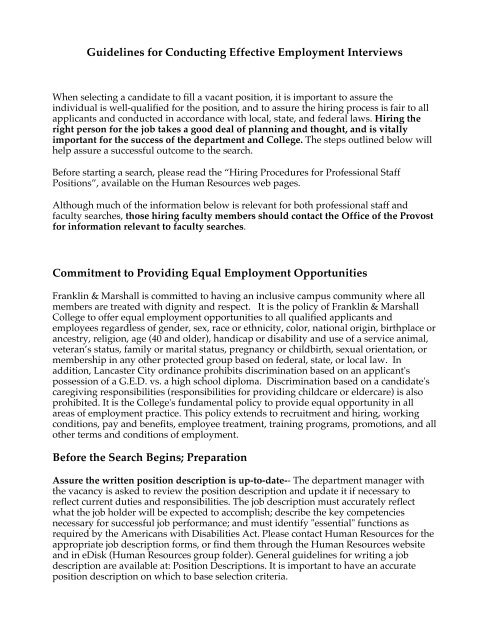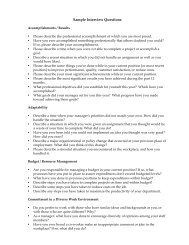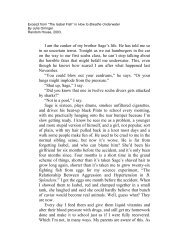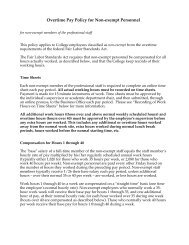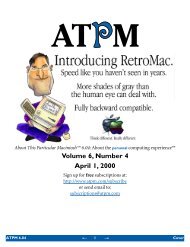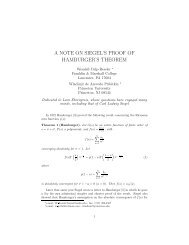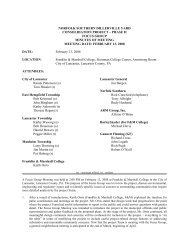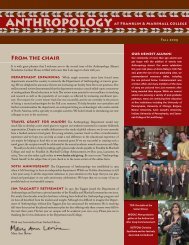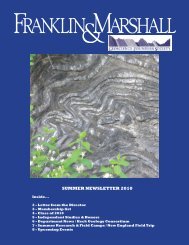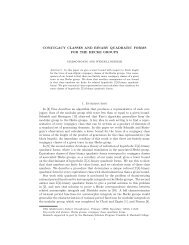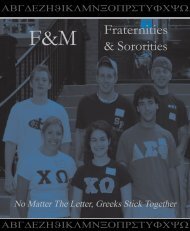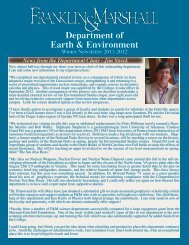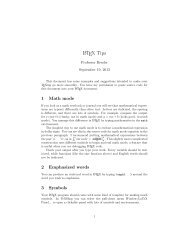Guidelines for Conducting Effective Employment Interviews
Guidelines for Conducting Effective Employment Interviews
Guidelines for Conducting Effective Employment Interviews
You also want an ePaper? Increase the reach of your titles
YUMPU automatically turns print PDFs into web optimized ePapers that Google loves.
<strong>Guidelines</strong> <strong>for</strong> <strong>Conducting</strong> <strong>Effective</strong> <strong>Employment</strong> <strong>Interviews</strong>When selecting a candidate to fill a vacant position, it is important to assure theindividual is well-qualified <strong>for</strong> the position, and to assure the hiring process is fair to allapplicants and conducted in accordance with local, state, and federal laws. Hiring theright person <strong>for</strong> the job takes a good deal of planning and thought, and is vitallyimportant <strong>for</strong> the success of the department and College. The steps outlined below willhelp assure a successful outcome to the search.Be<strong>for</strong>e starting a search, please read the “Hiring Procedures <strong>for</strong> Professional StaffPositions”, available on the Human Resources web pages.Although much of the in<strong>for</strong>mation below is relevant <strong>for</strong> both professional staff andfaculty searches, those hiring faculty members should contact the Office of the Provost<strong>for</strong> in<strong>for</strong>mation relevant to faculty searches.Commitment to Providing Equal <strong>Employment</strong> OpportunitiesFranklin & Marshall is committed to having an inclusive campus community where allmembers are treated with dignity and respect. It is the policy of Franklin & MarshallCollege to offer equal employment opportunities to all qualified applicants andemployees regardless of gender, sex, race or ethnicity, color, national origin, birthplace orancestry, religion, age (40 and older), handicap or disability and use of a service animal,veteran’s status, family or marital status, pregnancy or childbirth, sexual orientation, ormembership in any other protected group based on federal, state, or local law. Inaddition, Lancaster City ordinance prohibits discrimination based on an applicant'spossession of a G.E.D. vs. a high school diploma. Discrimination based on a candidate'scaregiving responsibilities (responsibilities <strong>for</strong> providing childcare or eldercare) is alsoprohibited. It is the College's fundamental policy to provide equal opportunity in allareas of employment practice. This policy extends to recruitment and hiring, workingconditions, pay and benefits, employee treatment, training programs, promotions, and allother terms and conditions of employment.Be<strong>for</strong>e the Search Begins; PreparationAssure the written position description is up-to-date-- The department manager withthe vacancy is asked to review the position description and update it if necessary toreflect current duties and responsibilities. The job description must accurately reflectwhat the job holder will be expected to accomplish; describe the key competenciesnecessary <strong>for</strong> successful job per<strong>for</strong>mance; and must identify "essential" functions asrequired by the Americans with Disabilities Act. Please contact Human Resources <strong>for</strong> theappropriate job description <strong>for</strong>ms, or find them through the Human Resources websiteand in eDisk (Human Resources group folder). General guidelines <strong>for</strong> writing a jobdescription are available at: Position Descriptions. It is important to have an accurateposition description on which to base selection criteria.
Identify and document competencies necessary to per<strong>for</strong>m the position effectively--Identify the knowledge, skills, abilities, educational requirements, and experiencenecessary to per<strong>for</strong>m the job effectively:• identify knowledge the job holder must possess (knowledge about the competitive/ business environment; expertise in his/her field; knowledge of current trends inthe field; general knowledge of challenges facing higher education, etc.)• define “technical skills” necessary <strong>for</strong> successful job per<strong>for</strong>mance (i.e., wordprocessing skills, fundraising expertise, knowledge of accounting regulations,ability to manage projects...)• identify interpersonal skills and attributes necessary <strong>for</strong> successful job per<strong>for</strong>mance(the ability to effectively lead and supervise people, the ability to motivate others, ,ability to collaborate with others, respect <strong>for</strong> diversity, respect <strong>for</strong> confidentiality...)• define what the job holder must be able to do / accomplish in order to be successfulin the position• think about the skills and abilities that will compliment those already presentamong your staff members• consider the kinds of past work experiences and other educational, professional, orcommunity service experiences that may have helped develop desired skills andabilities• think about the importance of commitment to the mission of Franklin & Marshalland ability to help achieve strategic objectivesDetermine in advance whether any skills or abilities will be weighed more heavily thanothers. Also, determine whether prior work experience is an acceptable substitute <strong>for</strong><strong>for</strong>mal education. Refer to the written job description when identifying required skillsand abilities. When determining what it will take to be successful in the position,consider getting input from those with whom the job holder will interact. Also, thinkabout what made prior job holders either successful or unsuccessful in the position.Be sure to avoid requirements that could be construed as discriminatory-- For example,avoid requiring candidates be "recent graduates" or "energetic", which might beperceived as wanting young candidates. Instead, you may require that the successfulcandidate be "able and willing to work long hours and a flexible schedule".Be sure all required skills and abilities, prior work experience requirements, andrequired degrees or certifications are truly necessary <strong>for</strong> effective job per<strong>for</strong>mance--For example, requiring a college degree when one is not truly necessary <strong>for</strong> effective jobper<strong>for</strong>mance may unnecessarily screen out a large number of potential employmentcandidates.It is important to document the skills, abilities, and other qualifications upon which eachcandidate will be evaluated so there is a record of selection criteria.Form the search committee-- Generally, several individuals participate in the searchprocess, <strong>for</strong>ming a search committee. The search committee is typically comprised ofCollege employees (and students, depending on the vacant position) who will frequentlyinteract with the individual hired, both from within and outside the department. Adiverse search committee will help assure different perspectives are considered.
Search committee members generally (1) develop and/or refine the list of skills, abilities,knowledge, and experience the successful candidate must possess to per<strong>for</strong>m the jobeffectively; (2) screen resumes and determine who to interview, based on who appears topossess necessary job skills and experiences; (3) develop an interview guide, andcoordinate, schedule, and conduct interviews; (4) evaluate each candidate based on jobrelatedcriteria; (5) check the references of the top (most qualified) candidates; (6)recommend the most qualified few candidates to the department manager and/or VicePresident/Provost; (7) document the reasons <strong>for</strong> the committee's recommendation; (8)notify all candidates who were interviewed but will not be offered the position. Searchcommittee members also per<strong>for</strong>m the important task of helping each candidate feelwelcome, and helping to assure each candidate <strong>for</strong>ms a positive impression of theCollege.The manager with the vacancy should discuss, in advance, with the search committee themethod <strong>for</strong> making the final selection decision. Generally, the search committee willmake a recommendation to the department manager and/or Vice President/Provost,and he/she will making the hiring decision. Or, the search committee may recommendthe top (most qualified) few candidates, and then the department manager or generalofficer will make the final selection decision.In<strong>for</strong>m all those participating in the selection process-- Assure that everyone who willcome in contact with the candidates and/or will participate in the selection processunderstands the College's Equal <strong>Employment</strong> Opportunity policy and how to conduct aneffective, fair, and legally-sound interview. Anyone not participating in interviews, butwho may escort candidates to lunch or from interview to interview, should be aware ofquestions which may be construed as discriminatory (see below). Please contact HumanResources <strong>for</strong> interview skills training if selection team members have not had priortraining.Additionally, those participating in the selection process should understand thatcandidates will be evaluating the College just as the College will be evaluatingcandidates. Throughout the search process, each candidate should feel welcome and betreated as a “V.I.P.”.Prepare a draft employment ad-- In addition to submitting an up-to-date job description,the manager / search committee chair should send the Associate Director, HumanResources the following in<strong>for</strong>mation, to be incorporated in the job advertisement:• the knowledge, skills, abilities, and other qualifications necessary <strong>for</strong> successful jobper<strong>for</strong>mance• required education level and any necessary certifications• the amount and type of prior work experience necessary <strong>for</strong> effective jobper<strong>for</strong>mance (note whether prior work experience is an acceptable substitute <strong>for</strong><strong>for</strong>mal education)• any special requirements such as frequent travel, weekend and evening work, theability to safely lift significant weights, etc. (requirements which could be construedas discriminatory must be avoided, such as "recent college graduate" or "youngprofessional")• a brief description of what the job holder will be expected to accomplish (whathe/she will need to do in order to succeed in the position)
The advertisement will describe the main responsibilities associated with the position;what the job holder will be expected to accomplish; and the skills, abilities, educationalbackground, and prior professional experience necessary <strong>for</strong> effective job per<strong>for</strong>mance.All employment ads will be finalized and placed by Human Resources.Human Resources will assist the manager / search committee in identifying appropriaterecruitment sources. Normally, as appropriate to the position, managerial andprofessional vacancies are advertised regionally or nationally, and support staffvacancies are advertised locally. A good-faith ef<strong>for</strong>t must be made to recruit qualifiedcandidates from diverse backgrounds. In an ef<strong>for</strong>t to broaden the candidate pool, HumanResources sends employment ads to several Lancaster County community agencieswhich serve a diverse population.Screening Resumes, Checking References, and Interviewing CandidatesScreen resumes / applications -- During this stage of the selection process, resumes andapplication materials are evaluated to determine whether a candidate warrants furtherconsideration. When selecting applicants to interview, look <strong>for</strong> those who, based onin<strong>for</strong>mation included on their resumes, cover letters, and applications, appear to possessthe minimum necessary qualifications as listed in the employment ad. A simple checklist,which lists the required and preferred qualifications as documented in the employmentad, can be used to track which applicants appear qualified. The name of each applicantcan be written on the checklist, and a check mark placed by those qualifications he/sheseems to possess based on the resume.When screening applications, consider:• Did the applicant provide a well-written cover letter (proper grammar,punctuation, and spelling; clear and concise)?• Does the cover letter provide useful in<strong>for</strong>mation about the candidate's professionalinterests and abilities as related to the vacancy?• Does the applicant explain why he/she wants to work at Franklin & Marshall; doesthe applicant demonstrate a desire to become part of the Franklin & Marshallcommunity?• Is the applicant's cover letter tailored to the vacant position, or a <strong>for</strong>m letter?• Is the applicant's resume well-organized and well-written?• Does the applicant possess the minimum education and experience requirements asstated in the employment ad?• Does the applicant have skills and experiences that can easily transfer / areapplicable to the vacant position, even if he/she has no prior experience in a similarposition or in higher education?• Has the applicant done volunteer work or been involved in organizations thatlikely will have helped him/her refine necessary job skills?• Does the applicant's resume include in<strong>for</strong>mation about his/her professionalaccomplishments, vs. simply a list of his/her previous job duties? (For example,
"successfully recruited and retained 35 volunteers", vs. "was responsible <strong>for</strong>recruiting volunteers".)• Are there any unexplained gaps in the applicant's employment history? (This maynot be reason to exclude the applicant from consideration, but may be something toexplore further via a phone interview.)• Is the applicant currently employed? (Being unemployed is not a reason to excludea candidate from consideration, but something to be explored further during aninterview.)• Has the applicant changed jobs frequently?• Has the applicant indicated he/she left previous employment due to "difficultieswith supervisors" or similar reasons?• Has the applicant worked <strong>for</strong> companies / institutions similar to Franklin &Marshall, meaning he/she may have a smoother transition if hired (highereducation or non-profit institutions, similar in size and complexity, etc.)? Or, hasthe applicant worked <strong>for</strong> companies very different from the College, perhapsmeaning he/she may bring a different, valuable perspective?• Does the applicant's employment history show a record of upward movement /steady promotion?• Has the applicant requested a salary that cannot be met?Comments about applicants should not be written directly on resumes or applications.Make notes, on a separate sheet of paper, of items listed on the resume that you wouldlike to explore further with each applicant. As practical, a few members of the searchcommittee should review each resume to help ensure fairness and effectiveness, ratherthan having only one person evaluate a resume.Check references-- Thoroughly checking references be<strong>for</strong>e an offer of employment ismade is extremely important. Through reference checking, you may obtain a morecomplete, accurate picture of each candidate.Reference checks may be conducted be<strong>for</strong>e or after employment interviews. Checkingreferences be<strong>for</strong>e scheduling interviews may help eliminate unsuitable candidates. Areference check must be conducted be<strong>for</strong>e any offer of employment is made. Themanager / search committee chair is responsible <strong>for</strong> conducting reference checks <strong>for</strong>those candidates who are being considered <strong>for</strong> employment. The manager / searchcommittee chair should attempt to obtain relevant work history in<strong>for</strong>mation from thecandidates' previous, as well as current, managers. Questions asked of previousemployers are to focus on each candidate's job-related skills, abilities, accomplishments,and experiences. A Reference Check Form, available from the Human Resources webpages and in eDisk, may be used as a guide.Please note: The candidate is to be notified, in advance, that his/her current employerand others will be contacted <strong>for</strong> a professional reference. Please be sure to obtain thecandidate's permission be<strong>for</strong>e contacting his/her current employer.
Tips <strong>for</strong> conducting useful reference checks:• When checking references, consider contacting your professional associates(individuals you know) who also know the candidate, as you may receive moreuseful in<strong>for</strong>mation.• When speaking to references, listen <strong>for</strong> clues that you may not be getting the fullpicture of a candidate, and then probe further with specific questions. If theindividual to whom you are speaking hesitates when responding to a question,consider probing further.• If you learn something negative about a candidate (or something positive), try toconfirm the in<strong>for</strong>mation by speaking with other references. This must be donecarefully, though, so as not to inadvertently spread false in<strong>for</strong>mation about acandidate.• If you receive in<strong>for</strong>mation of concern from a reference, ask the candidate questionsduring the interview to try to determine whether the in<strong>for</strong>mation you received isaccurate.• If unable to obtain references from a candidate's current or <strong>for</strong>mer supervisors,consider asking the candidate to provide a copy of his/her recent per<strong>for</strong>manceevaluations.In addition to employment reference checks, Human Resources will verify educationalbackground as well as conduct a criminal background check. Human Resources willassist with reference checks upon request.Formulate interview questions in advance-- Develop interview questions aimed atassessing whether each candidate possesses the skills, abilities, knowledge, andprofessional experience you previously determined are necessary <strong>for</strong> effective jobper<strong>for</strong>mance. Think about what questions will help you assess whether a candidate willbe able to achieve necessary goals and accomplishment what needs to be accomplished.Sample interview questions can be found athttp://www.fandm.edu/humanresources/article/hiring-procedures-<strong>for</strong>-professionalstaff-positions(tailor sample questions to the particular skills, knowledge, and abilitiesrequired <strong>for</strong> the vacant position). In addition, the www.hr-guide.com/ selection.htmwebsite lists numerous sample interview questions, sorted by topic.Past job per<strong>for</strong>mance is often one of the best predictors of future job per<strong>for</strong>mance.There<strong>for</strong>e, interview questions should require candidates to describe things they actuallydid or said in a previous situation and the outcome of their actions. Questions that will<strong>for</strong>ce the candidate to describe specific situations from his/her past may elicit the mostuseful in<strong>for</strong>mation (i.e., "Please describe a time when you disagreed with a co-worker.How did you handle the situation?" or "Please describe a major project on which youworked during the past year. What did you do to assure you would complete the projecton time?"). Try to avoid hypothetical questions (such as "If you had a problem with a coworker,how would you handle it?"), as candidates may simply give the response theythink you want to hear.Develop an interview guide-- Write the questions you plan to ask candidates, and leaveroom on your paper to record their responses. Writing the questions be<strong>for</strong>e the interviewmakes it easier to ask the right questions of each candidate, and documenting eachcandidate's responses makes it easier to assess skills and abilities after interviews. Avoid
writing non-job-related comments on your interview guide (<strong>for</strong> example, do not writecomments about the candidate's appearance, race, etc.).Explore additional ways to assess candidates' skills and abilities-- Consider whetheradditional in<strong>for</strong>mation will be required of each candidate be<strong>for</strong>e or during the interviewprocess. For example, as appropriate to the vacant position, each candidate may be askedto: give a brief presentation on a relevant topic; provide work samples; prepare a briefwritten report on a current topic in their field or a best practice; compose a letter, etc. Besure to establish the same requirements of all candidates, and be sure you can explainhow the skills and abilities being assessed are related to necessary job skills.Because employment tests may be determined to have an "adverse impact" on aprotected group, managers / search committees must contact Human Resources be<strong>for</strong>eusing any type of skills assessment, physical fitness evaluation, "personality" test, orother type of employment test during the search process.Develop an evaluation sheet-- A systematic evaluation of candidates' responses tointerview questions and any other assessment methods allows <strong>for</strong> a fair comparisonacross candidates who are often interviewed by different individuals. A standardizedevaluation process helps assure all candidates are evaluated on the same basis. To makethe interview process more objective, you may want to list all required job skills, abilities,and experience/education requirements on an evaluation sheet. Then, after eachinterview, the search committee or interviewer can rank each candidate from 1 to 5 oneach required job skill and ability. Totaling the rankings <strong>for</strong> each candidate following allinterviews may help guide your selection decision.Develop the interview agenda and schedule interviews-- After <strong>for</strong>mulating interviewquestions, determine with whom candidates will meet while on campus (student groups,department members, campus committees, etc.). It is generally recommended that atleast a couple staff members who will be supervised by the new employee have theopportunity to meet all candidates, such as by taking the candidates to lunch. Allow thesame amount of time <strong>for</strong> each candidate's interview.When planning the campus visit:• allow a few minutes between interviews so candidates have time to checkmessages, use the restroom, etc.• assure each candidate receives an interview or campus visit schedule in advance,listing the name and title of each individual with whom he/she will meet• build in time <strong>for</strong> a campus tour or tour of Lancaster as appropriate• arrange to pick up each candidate from the airport, train station, or hotel asappropriate, and arrange transportation back to the airport, train station, or hotel atthe end of the day• arrange <strong>for</strong> a search committee member to escort each candidate from interview tointerview, if the candidate will be moving to several locations on campus• arrange to have lunch or dinner with each candidate if interviews will extendthroughout the day• consider giving each candidate a small gift such as a Franklin & Marshall coffeemug
• give each candidate up-to-date brochures that highlight the College and activities(check with College Communications, the Admission Office, Theater, Dance andFilm, the Music department, Athletics, the Writers House, etc. <strong>for</strong> brochures or listsof current events)• give out-of-town candidates in<strong>for</strong>mation about Lancaster (there are links toresources at http://www.fandm.edu/humanresources/employmentopportunities)As candidates are contacted to schedule interviews, it is recommended they be asked ifthey have a minimum salary requirement - this may screen out those whose salaryexpectations cannot be met.The department manager or search committee chair is to contact candidates who aregoing to be interviewed, to schedule the interviews. Generally, at least 3 candidates whoappear qualified should be interviewed <strong>for</strong> each vacant position. The Associate Director,Human Resources generally interviews each candidate who comes to campus, andshould be contacted when scheduling such interviews.Conduct telephone interviews as appropriate-- With employment candidates who liveout of the area, an initial telephone interview should be conducted, references should bechecked, and educational background should be verified be<strong>for</strong>e inviting the candidate totravel to campus.Create a relaxed atmosphere-- Start the interview by attempting to make the candidatefeel com<strong>for</strong>table. As noted above, all candidates should be treated as "V.I.P.'s" to helppromote a positive image of the College. Introduce yourself and search committeemembers, if applicable. Explain, in broad terms, the requirements of the vacant position(without providing too much detail or the candidate may gear responses to what he/shebelieves you want to hear). Start with fairly standard questions, such as "Please describeyour current job responsibilities". Be sure to avoid inadvertently askinginappropriate/illegal questions while making small talk with a candidate.Ask the same or similar questions of each candidate-- Use your written interviewquestions to guide you. This will help assure each candidate is being judged based on thesame criteria and helps eliminate any perception that the interview process is biased.Avoid asking different questions of female candidates than of male candidates, ordifferent questions of younger vs. older candidates. Try to record each candidate'sresponses verbatim; having a record of each candidate's responses will be helpful ifseveral candidates are interviewed over the course of several weeks.Ask open-ended questions-- To elicit the most in<strong>for</strong>mation, ask questions which requiremore than a 'yes' or 'no' response. For example, ask "What do you like about your presentjob?" rather than "Do you like your present job?".Focus on past job per<strong>for</strong>mance-- The majority of questions should require eachcandidate to describe, in specific terms, how he/she has handled various work-relatedsituations in the past, and the outcome of his/her actions. See the Sample InterviewQuestions document, available from the Human Resources web pages(http://www.fandm.edu/humanresources/college-policies ), <strong>for</strong> examples.
• How long do you plan to continue working? When do you plan to retire? (Okay:"Where do you see yourself, in terms of your career, in 5 years?" Or, "What are yourlong-term career goals?")• Where were you born?• Where were your parents born?• Are you a U.S. citizen? (Okay question: "If offered this position, will you be able toprovide verification of your ability to legally work in the U.S.?")• What type of accent is that?• Where do you live? (Okay: "If offered this position, you will need to be on campus 5days per week, plus occasional weekends. Will you be able to meet thisrequirement?")• Do you rent your home or own your home?• Did you graduate from high school or did you receive your G.E.D.?• Do you have a disability / medical condition / handicap that will prevent you fromper<strong>for</strong>ming any job assignments? (Okay question: "Will you be able to per<strong>for</strong>m allessential functions of this job?")• Will you need an accommodation to per<strong>for</strong>m job duties? (Okay question: "Are youable to per<strong>for</strong>m the essential functions of this position, with or without reasonableaccommodation?")• How many sick days did you use last year? (Okay question: "Can you meet theattendance requirements of this position?")• Have you ever taken a disability or medical leave?• Are you taking any medications?• Have you ever filed a Workers' Compensation claim? Have you had any workrelatedinjuries? (Okay question: "Describe how you would safely per<strong>for</strong>m all jobduties.")• To what organizations or clubs do you belong? (Okay question: "Do you belong toany professional organizations that you believe have helped prepare you <strong>for</strong> thisposition?")• Have you ever been arrested?• What type of discharge did you receive from the military?• Where do you go to church?• Can you work on Sundays? Are you a member of a religion that will prevent youfrom working on Saturdays or Sundays? (Okay question: "The normal workinghours <strong>for</strong> this position are 8:00 a.m. - 4:30 p.m., Monday through Friday. Frequentweekend overtime is required. Are you able to work these hours, with or without areasonable accommodation?") Note: reasonable job accommodations based onreligion may be required; the facts of each case should be promptly reviewed byHuman Resources.• Have you ever belonged to a union? What is your view on unions?
Please note: questions that could be construed as discriminatory may inadvertently beasked while engaging in "small talk" with a candidate (i.e., "You look familiar - didn't yougo to McCaskey High School? What year did you graduate?" or "We offer great educationbenefits <strong>for</strong> the children of employees. Do you have children?"). Such questions andcomments are to be avoided.If an employment candidate volunteers in<strong>for</strong>mation about his/her race, national/ethnicorigin, religion, age, disability or medical condition, sexual orientation, or family status,the interviewer should refrain from responding or asking <strong>for</strong> additional in<strong>for</strong>mation, andinstead should move on to an appropriate question.Provide a realistic job preview and highlight the benefits of being part of the Franklin& Marshall community-- Describe the position requirements in more detail so thecandidate can fairly assess whether he/she is truly interested and suited <strong>for</strong> the position.Provide a realistic description of the position and department, including typical workhours, job duties, reporting relationships, department objectives, and generalper<strong>for</strong>mance expectations. Also, take some time to highlight the benefits of working in acollege environment (access to lectures, per<strong>for</strong>mances, and other events, meaningfulwork, respectful and unique work environment, nice physical setting, great diningvenues, interesting and committed colleagues, generous benefits package, etc.).Human Resources will interview each candidate and, as part of this interview, willreview in<strong>for</strong>mation about fringe benefits.It is recommended that each candidate be given a tour of the work area during theinterview process.Ask <strong>for</strong> questions from the candidate-- After the interviewers have asked questions ofthe candidate, give the candidate the opportunity to ask questions about the College, theposition, and the campus environment.Close the interview-- Let the candidate know you will be checking his/her employmentreferences. Let the candidate know when he/she can expect to hear from you (i.e., "Weare interviewing a few more candidates. You should hear something in about twoweeks."). Thank the candidate <strong>for</strong> his/her interest in the position.Avoid promises-- During and after the interview process, avoid making any implicit orexplicit promises or guarantees of long-term employment, future pay increases, regularpromotions, etc. (such as, "If hired, you'll receive regular merit increases.", or "If youaccept this position, you'll have a long future with Franklin & Marshall."). Additionally,<strong>for</strong> those hired on a fixed-term appointment, such as visiting faculty or part-time coaches,avoid implying that the term will automatically be renewed.Department managers / search committee chairs are also advised not to notifyemployment candidates of the maximum approved salary <strong>for</strong> the position, but mayprovide general salary in<strong>for</strong>mation (i.e., "low $40,000 range").After the Interview; Making the SelectionEvaluate each candidate based on required skills and abilities-- Evaluate eachcandidate based on his/her skills, abilities, educational background, and experience as
elated to those skills, abilities, and education/experience needed to per<strong>for</strong>m the jobeffectively. Each candidate must be evaluated based on the same job-related criteria.Factors such as gender, race, religion, national origin, age, disability, sexual orientation,color, or family status must not influence the evaluation of a candidate's ability toper<strong>for</strong>m the job. Avoid making assumptions about candidates based on stereotypes andavoid jumping to conclusions based on appearance or other non-job-related factors. Forexample, it is illegal to avoid offering a job to a male candidate based solely on theassumption that a man cannot coach female athletes, or to assume during the selectionprocess that a professor in the Spanish department must be of Spanish descent (althoughyou may certainly require that a Spanish professor speak and write fluently and have indepthknowledge of Spanish culture, history, geography, etc.). Take time to <strong>for</strong>mulateyour opinion of each candidate; give him/her a fair opportunity to demonstratequalifications.Each candidate should be evaluated in comparison to other candidates, and also onhis/her own merits. When evaluating candidates, the manager / search committee maywish to use an evaluation sheet as discussed above; rank the candidates based on howwell they meet the criteria necessary <strong>for</strong> successful job per<strong>for</strong>mance, with the #1 rankinggoing to the candidate who best meets the criteria; or summarize each candidate'sstrengths and each candidate's weaker areas.When evaluating employment candidates, avoid these errors:• Focusing solely on personality traits versus work experience and abilities.• Allowing personal bias to influence the evaluation of a candidate rather thanfocusing on the skills, knowledge, and abilities of the candidate.• Making assumptions about candidates based on appearance; allowing stereotypesto influence the selection decision.• Allowing one characteristic of a candidate to be overly influential (either positivelyor negatively).• Comparing the candidate to oneself (the interviewer) and making judgementsbased on how similar or dissimilar the candidate is to the interviewer.As you are evaluating candidates, consider both in<strong>for</strong>mation you gained throughemployment interviews and in<strong>for</strong>mation you obtained through your reference checks.If none of the candidates are well-qualified <strong>for</strong> the position, the search should continue.Document reasons <strong>for</strong> the selection decision-- Keep documentation of each candidate'sstrengths and weaknesses, skills, abilities, relevant knowledge, professional experience,and what you learned from professional references. Document observable behaviors ofthe candidates, rather than your impressions (<strong>for</strong> example, "John Doe responded in a curtmanner to interviewers' questions", rather than "John Doe seemed rude").Forward documentation regarding the selection decision to Human Resources-- Forprofessional staff searches, send documentation regarding the selection decision, and allsearch committee members' notes, to the Associate Director, Human Resources be<strong>for</strong>e anoffer of employment is made. A New Hire Documentation Form (available from the
Human Resources web pages and in the Human Resources public folder in eDisk) maybe used to document the selection decision.Human Resources will retain all applications, resumes, notes, and documentationregarding the selection decision as required by law (generally <strong>for</strong> at least 1 year).Consult with the Associate Director, Human Resources regarding the employmentoffer-- Discuss your selection decision with the Associate Director, Human Resourcesbe<strong>for</strong>e a verbal offer of employment is made. (Note, please discuss compensation with theAssociate Director, Human Resources, be<strong>for</strong>e making the verbal offer. Newly hired staffmembers generally may not be offered campus housing, either on a rent-free or rentpayingbasis, as part of their compensation package. Only staff who are required, basedon their job duties, to live on or close to campus may be offered campus housing. Suchsituations must be reviewed in advance with the Director or Associate Director, HumanResources, because of the possible income tax implications.)Notifying Unsuccessful Applicants-- After the verbal offer of employment has beenaccepted by the successful candidate, the manager / search committee chair is asked tonotify the following applicants that the position has been filled:Ø each internal applicant (i.e., current College employee who applied),Ø any alumni of Franklin & Marshall who applied <strong>for</strong> the position,Ø any other candidates who were interviewed but will not be offered theposition.Human Resources will notify all other applicants. No detailed in<strong>for</strong>mation should beprovided to unsuccessful applicants other than to let them know the College appreciatestheir interest in Franklin & Marshall but we are unable to offer them employment. Asimple <strong>for</strong>m letter may be sent, or each individual may be contacted by phone. Sample<strong>for</strong>m letters are available in the Human Resources public folder in eDiskIt is especially important to promptly notify all internal applicants as well as Franklin& Marshall alumni who applied <strong>for</strong> the position, whether or not interviewed, that theywill not be offered the position.Please see “Hiring Procedures <strong>for</strong> Professional Staff Positions”, available on the HumanResources web pages (http://www.fandm.edu/humanresources/college-policies ), <strong>for</strong> morein<strong>for</strong>mation about conducting a search.Note: all applicant in<strong>for</strong>mation gathered during a search must be treated as confidential.All notes / correspondence regarding a candidate must be strictly job-related with noreferences to physical appearance, age, marital or family status, disability, gender, etc.


